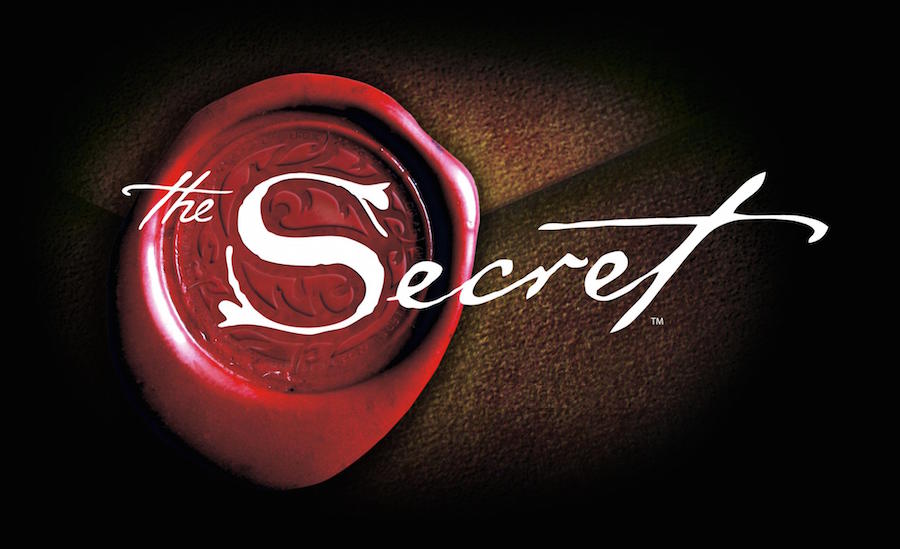I’ve got a secret about The Secret
Now, I’m certainly not as astute as Sherlock Holmes, but I can sense malarkey when it comes to the Law of Attraction. If you aren’t familiar with this pseudoscience yet, the Law of Attraction, which arose out of the New Thought movement, states that one’s mental state emanates energy that sends out messages and attracts similar things; hence positive thoughts will amass positive results, and negative thoughts will be followed by negative results. The biggest selling point of this theory is that if one visualizes an object with full focus, some “Universe” deity will somehow manage to deliver the manifestation of said object.
Needless to say, there is absolutely no scientific basis to the Law of Attraction. Yet it has managed to garner massive popularity due to the 2006 self-help book The Secret, by Rhonda Byrne, touting this “law.” Snake-oil seller Byrne backs up her claims by throwing around scientific jargon like “frequency,” “quantum physics,” and “magnetism.” It’s really a farce, as explained by author and media entrepreneur Jonathan Fields.
The pernicious aspect of this belief is that it condones extreme wishful thinking, rendering people to merely sit around and visualize their goals instead of taking real initiative. The law’s mantra literally goes like this: ask, believe, and receive. It’s a terrible maxim, as it’s just a lazy response to the age-old quest for “the secret to getting whatever you want.”
What’s more, how could this Supreme “Universe” Being differentiate between “positive” and “negative” energy? As humans, we’ve established this dichotomy through biased perspectives. Similarly, Dr. Masaru Emoto’s dubious rice experiment claimed that thanking, insulting, or ignoring three jars of rice with water will lead to fermented, fragrant rice, or moldy rice, or rotten rice, respectively. Author of the popular, but heavily-criticized 1999 book, Messages from Water, Emoto believed that the rice reacts this way because of the positive or negative energies that had been transmitted. Yet, it must be said that negativity is associated with the mold-ridden rice merely because we can’t consume it anymore; apparently it never occurred to Emoto that the growth of new life, fungi, might actually be a good thing.
Along the same lines, out of galaxies, solar systems, and seven billion human beings, the belief that there is a cosmic deity, listening to your wishes and granting your desires is absolutely ludicrous. (In September the YouTube channel Porta dos Fundos hilariously depicts the absurdity of such a thought.) Santa Claus doesn’t exist! How is the Law of Attraction theory any different? Does the universe provide a gigantic vending machine? Will it grant people’s materialistic desires by delivering objects in parcels from the sky?
Furthermore, cultists who believe in the Law of Attraction never attribute deadly natural disasters or tragedies to “negative energy.” If only little Timmy stopped thinking negatively, would that tsunami never have hit him? Can we justify the death of thousands of starving children in the world by believing they haven’t visualized the prospect of receiving food forcefully enough? In reality, the “theory” endorses victim blaming that not only invalidates the crimes of the culprit, but instills shame on the victims themselves because they didn’t try hard enough.
But, to an extent, I do acknowledge that the “Law of Attraction”—sans the supernatural component—holds some water. The placebo effect, for example, is a phenomenon where a patient undergoes a fake treatment or consumes a harmless pill but receives therapeutic benefits due to the belief that the placebo has curative powers. The expectation that the “medication” will help the patient does indeed come true. However, the placebo effect has been tested under controlled environments and has demonstrated measurable physiological effects through something called science.
Nonetheless, I’m obviously not advocating for the end of positive thinking. Naturally, optimism tends to spur motivation and dedication, which often yield good results. My complaint is the element of mysticism associated with this kind of thought. If you’re a believer of “The Secret,” by all means, I invite you to sit down and visualize the extermination of this article. If you focus hard enough, maybe the Talon gods will eradicate this from the archives. Ha—fat chance.
Sources: thesecret.tv, webmd.com

Bella is Bella. This is her second year in The Talon and she now holds office as POV Columnist. She needs 12 hours of sleep each day to function properly,...











MIkki • Jan 21, 2020 at 10:12 pm
how do you think “the placebo effect” works? you WILL it to work. this isnt some santa clause or diety dropping something into your lap either. the “universe” doesnt tell the difference in positive and negative (you would know that if you actually stopped to listen instead of brushing it off as wishful thinking) its not even about having everything we want. its about what we think about. things you dont even realize youre thinking about cause ripples (think butterfly effect.) we are what we eat, just as we are what we think. its a lot more complicated than this one thing. its about the meaning of life and why were here in the first place. you may be starving or die in a tsunami because you chose that life before you got here. because its a learning process. you have to be the mother of a child that dies of cancer, you have to be the child that dies of cancer, you have to be rich, poor, black, white, live long, die young, be a free open spirit, be the skeptical student, and everything in between. poeople ask “why would God let this happen? it doesnt, and there isnt some little old man sitting on a cloud watching us making descisions either (sorry to burst your bubble everyone). you are an eternal spiritual being living a temporary mortal existance and we are all part of the same energy. you dont die forever. you go to the next life. you do this until youve learned that you can be whatever you want to be and you can change things at any time. its not about sitting around either. you have to be proactive. think positive and act positive. (God helps those who help themselves but you are part of God and He is part of you and we are all just one part of a whole so its YOU that helps yourself.) its way more in depth than anyone can really explain in one paragraph. or even one book. its a spiritual journey of discovery, as lame as that sounds. its the best i can describe it at the moment. the secret is just a layman’s guide to the first step. reality for dummies, if you will. you have to be everything there is to be before you’re done being. you choose where you go before youre born, that way you can be what you are when you get there. you choose to be a starving person in Etheopia, or a fat man in boston. its not about “oh poor poor pitiful me im dying in south africa and theres no reason for it” or “my life is wonderful in paris!” or really about anything at all once its over, its only about having that particular experience. none of it matters to anyone but you. its merely experience for experience sake, good and bad. every one of us has to go throught it all. you think most about what you are exposed to unless you choose to change that life pattern. which you can at anytime. thats the secret. thats the point you have to learn for yourself. like i said, the universe doesnt see good or bad, it just brings to you what you think about most. the more you believe that something is, the more solid that reality is for you. ether that is that you believe it works that way or not. if you dont believe it then that solidifies the fact that it isnt working. as for the rice experiment, we give meaning to the words we use. words are powerful. it isnt so much the words that matter, its the feeling behind them. its that meaning that makes the mold grow because he WILLED it to grow that way. it isnt negative or positive we’re really proving, its the fact that because he believed the mold would grow in the hated container IT DID. what we think and feel affects the world around us. thoughts are things. and every one would do well to remember that.